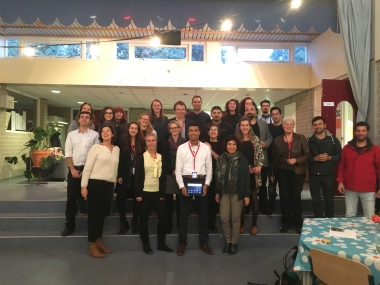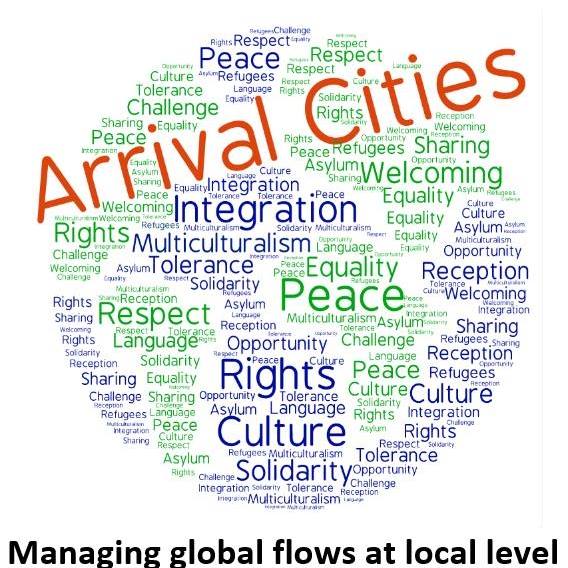Inclusion of Migrants and Refugees
Edited on
02 October 2018The University of Dresden, and the Municipality of Thessaloniki, Arrival Cities Partners, participated in the Working Conference on Reception and Housing which took place in the DeLaMar theatre in Amsterdam on 10 and 11 November 2016, togheter with other representatives of Municipalities and Universities from all Europe. Magdi Khlail, Dresden Local Coordinator, and Stefania Pantazi Thessaloniki ULG member presented their feedbacks of the Conference.

Inclusion of Migrants and Refugees
10 and 11 November 2016 DeLaMar Theatre, Amsterdam
Feedback Report Dresden
Background
It was really interesting and fruitful experience to attend Working Conference on Reception
and Housing which took place in the DeLaMar theatre in Amsterdam on 10 and 11 November 2016. This two-day event, brought together experts from different backgrounds to generate expert input and produce workable solutions to the most pressing issues on the topics of reception and housing of migrants and refugees.
First day, Thursday, 10 November 2016
A Word of Welcome by Eberhard van der Laan, Mayor of Amsterdam was given. He is opened mind and dynamic person. He has a deep understanding regarding Migrants and Refugees. He believes that the integration of Migrants and Refugees should start from the first day they arrive.
The Keynote Address by Marc Calon, President of Housing Europe & Chairman of Aedes. He mentioned the importance of Migrants and Refugees to maintain a considerable development growth rate in Europe. After a short Introduction on the Working Methods & themes of workshop Workshop, Reception session has started.
The first session of the workshop was about Health care. It lasted one hour. Four main bottlenecks were given to the participants for reflections and to give solutions
1- Untimely treatment
2- Low minimum standards
3- Funding mismatch
4- lack of knowledge about treatments options
Participants have been divided by the facilitators into mini groups, 2-3 persons for each and were given about 15 minutes to find solutions. Each mini group representative was asked to give a brief. I have been asked by my mini group to give the brief on behalf. Then the facilitator made a conclusion and asked each participant to give voting to the best three solutions. Our suggested solutions got the top record such as screening should be carried out at early stages.
Second session workshop have started after the break and was devoted to Early Integration. Three main bottlenecks were given once more to the participants to think and give solutions.
1- lack of early integration support measures
2- lack of funding opportunities
3- lack of good practice transfer and little awareness
The same methodology mentioned above was implemented and I have given the summary of my mini group and once more our proposed points got the highest record after voting. Such as creating a data base platform.
Second day, Friday, 11 November 2016
The Keynote Address was given by Juan Diego Catalano, Member of the Palermo City Council and President of the Commission of Institutional Affairs. He confirmed the idea that almost all people are migrants! He supported his idea by giving many examples and one of them is Obama the president of USA. He is a migrant.
We had also two sessions but this time about Housing. The growing influx of refugees makes it hard to find accommodation for different groups of people wanting to live in cities. Furthermore, the availability of housing in cities determines how many resettled refugees can be received. The location as well as the type of housing is crucial for the integration and prospects of migrants and refugees. The sessions dealt with Access to Housing where three main bottlenecks were given to the participants to think and give solutions
1- Finance
2- House standers
3- Knowledge exchange
As mentioned before we were divided and I have been asked again by my mini group to give the brief on behalf. Once more our solutions got the top record such as low standard houses and supporting host family with same back ground
Then afternoon we had a site visit to BOOST Ringdijk. Boost Rindijk is a temporary work and meeting space for refugees and local residents to get to know each other, and work together to develop activities that advance integration and inclusion. Among other things, Boost Ringdijk organizes language classes, sports activities, and informative workshops. See attached photo
Positives
1- Meeting and discussing with different experts (among them politicians, technocrats, professionals ) from all over Europe
2- Methodology used was so effective and useful
3- effective ideas have been mentioned:
Early integration: Creating Fund for cultural and similar background private organizations
Health Care: Early migrants screening
Access to housing: Support families with similar background to host new migrants
Access to housing: Mobility with lower standers
4- BOOST Ringdijk is a good example to positive interact between society and new migrants.
5- Inclusion of Migrants and Refugees is not temporary or local problem
Magdi Khlail (University of Dresden Local Coordinator)
-----------------------
Inclusion of Migrants and Refugees
10 and 11 November 2016 DeLaMar Theatre, Amsterdam
Feedback Report Thessaloniki
On November 10th and 11th I participate in the Working Conference on “Reception and Housing of Migrants and Refugees” on Amsterdam. During the first two days of the conference, the issues that were discussed concerned all the Μember States. The topics were specified on the integration and the hosting both of refugees and migrants in the receiving countries. The exchange of ideas, of experiences, the differentiation on approaches, the environment and the different receiving systems were a positive experience and a positive perspective. Being present to the conference facilitated on one hand the connection between different organizations and on the other hand it gave us the opportunity to record all the obstacles that we faced dealing with the refugee and migrant flows. The appearance of experts from different working places, for instance the executives from European Commission, members from the national asylum services and migration, from Educational Institutes, from Local Administration and NGOs who worked hard, in order to feature good practices on the problems that the countries are facing from the lack of single rules and flexible financing.
Furthermore, the position of the experts (social workers, psychologists, medical staff, interpreters) was common; the employees need additional training to support and have a better understanding of the differences that exist dealing with health, mental health, the priorities and family relationships. The coordination with experts from refugees/migrants may support the local services but simultaneously will facilitate many of executive scientists to continue their life relating their assets. The certification of their assets is essential and the interpretation among the local services and the refugees requires steady and specialized training to the interpreters.
The education to the languages of the receiving countries should focus on the enhancement of skills which will make easier their access to the labor market.
The recognition of the gaps or of the difficulties that accrue concerns all the Member States. The conclusion from the work teams is that the health protection is not sure for all the refugees due to the fact that depends on the legal status in the country and the examination by the state of their asylum request. Countries that ensure free access to health services as Greece, in reality cannot put into practice this decision due to the lack of funds and human resources. As well as the access to work that would ensure the access to the health services.
However, changes or shaping on European registration might be made so that the procedure can be improved and applied to the needs of migrant, housing in the E.U. Regulations could be improved and simplified if there were more knowledge exchange and funds.
Some suggestions on getting better regulation are
-mixed housing
-match making
-combining the private sector with the public sector
-promoting success stories
-social real estate agencies
As far as the capacity building is concerned, public procurement as well as funds may often be experienced as a bottleneck. There is the need for more flexibility and adaptability in order to meet the needs of a challenging and urgent situation as the refugee crisis is.
Finally, the access of local societies to immediate funds could be a good and quick solution to these serious issues. The main reason is that the cities work and have knowledge of the problems at local level and is deliberate to have the possibility to response faster to their effort to deal with the everyday needs of the refugees.
Stefania Pantazi (Manager of NGO PRAKSIS and member of Thessaloniki ULG)
 Submitted by cvestrini on
Submitted by cvestrini on
